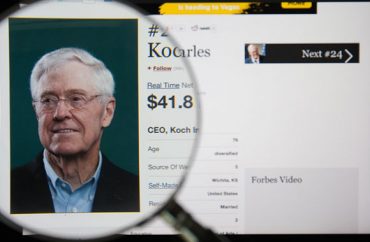
Want the law changed? Talk to the Legislature
The national movement against libertarian philanthropists Charles and David Koch* has sought records related to their university giving, looking for strings attached to money intended to create programs such as free-market research centers.
Such funds often move through university foundations, but in Virginia those aren’t actually public bodies and thus not subject to public-records law, a judge ruled Thursday.
Transparent GMU sued George Mason University when it refused to hand over information about the Charles Koch Foundation, which donated $10 million as part of a $30 million gift to the public university’s law school to rename it after the late Supreme Court Justice Antonin Scalia and fund new law programs.
According to Fairfax Circuit Court Judge John Tran, the plaintiffs can’t rely on other states’ laws and court decisions to judge how university foundations are treated under Virginia law.
Tran previously dismissed GMU itself as a defendant in the litigation, but his ruling makes clear that the university still has the responsibility as a public entity “to maintain records of the use of funds and programs it decides to develop.” He also said that records originating with GMU “and subsequently transferred elsewhere” are still subject to public-records law.
But state law is clear on the university foundation’s status, Tran said. He decided against applying legal tests known as “functional equivalent” and “totality of the circumstances” to the question, saying that would “create a new standard in Virginia” that adds to the “plain language” of the statute.
The foundation is not “supported wholly or principally by public funds” not only because the law narrowly defines public bodies, but also because such bodies procure their money “involuntarily” through taxation, as opposed to private donations, Tran wrote.
The money donated to the foundation also does not go into the state treasury:
In the absence of clear legislative directive that entities such as the Foundation are to be considered public bodies, their right to exist as independent and privately formed entities overcomes the right of public inspection.
Tran said deciding the foundation is public “would place an impermissible judicial gloss over the existing statutory provisions,” which the General Assembly is free to change.
Even though its sole purpose is to “serve” GMU, that does not make the foundation a “sub-entity,” the judge continued, citing a prior advisory opinion by the state attorney general and the foundation’s operation under its own set of “bylaws, articles of incorporation, and statutes.”
The calculus would change were GMU to transfer its endowment to the foundation or were the foundation to accept public money for a project, Tran said, citing rulings outside Virginia that transformed private foundations into public bodies.
MORE: Anti-Koch activists tolerate academic programs with liberal strings
Though Virginia law recognizes that university foundations are used to “advance the statutory objectives” of their affiliated public bodies, “[f]undraising is neither itself a service nor a statutory objective” of the university, the judge said. He pointed to specific language that excludes private donations from the state’s consideration of how much money to give public universities.
Again, it’s not the place of Virginia courts to “project any unspoken purpose” on the clear language of the statutes, Tran said.
But the judge said GMU doesn’t have the “unfettered right” to hide how it uses private donations and whether that use is “in compliance with conditions and restrictions” imposed by donors.
He pointed to at least one university office, the Gift Acceptance Committee, that might have the records sought by Transparent GMU because it’s jointly managed with the foundation and its work “cannot be conducted in secrecy.”
The state law itself allows for disclosure of “the amount, date, purpose and terms of the pledge or donation or the identity of the donor unless the donor has requested anonymity in connection with or as a condition of making a pledge or donation.” Tran said he doesn’t “presume” that university officials would try to evade this disclosure by doing all business “orally” so as to avoid producing written records.
Transparent GMU told Inside Higher Ed that it would appeal the ruling to the state supreme court because “the public has a right to know the details of our university’s operations, including its relationship with private donors.”
Frank LoMonte, director of the University of Florida’s Brechner Center for Freedom of Information, told the Student Press Law Center he thought the ruling had a decent chance of being overturned.
It’s not going to affect other states anyway, he said: “Virginia happens to have a narrow understanding of what it means to be a public body, that its courts have interpreted in an especially parsimonious way, but that’s an outlier position.”
Read the ruling, Inside Higher Ed and Student Press Law Center reports.
MORE: Left-wing students sue GMU to find strings attached to Koch donations
MORE: Koch support is dwarfed by gifts with a pronounced liberal agenda
IMAGE: GongTo/Shutterstock
Like The College Fix on Facebook / Follow us on Twitter






Please join the conversation about our stories on Facebook, Twitter, Instagram, Reddit, MeWe, Rumble, Gab, Minds and Gettr.